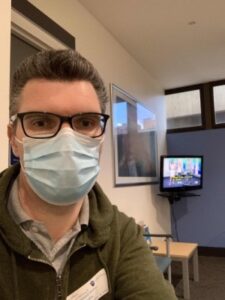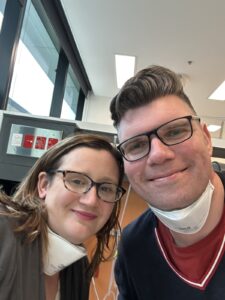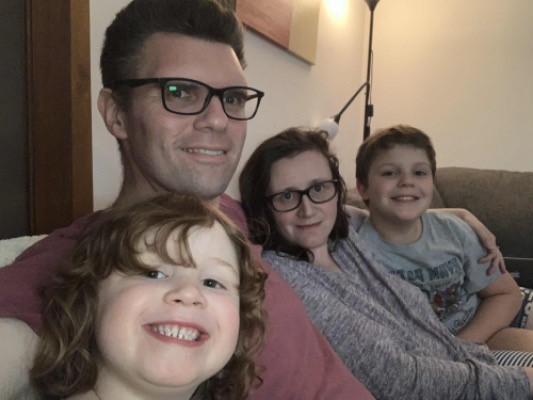In 2020, as Nick puts it, “the world went pear-shaped”.
Living in Melbourne, Nick endured heavy COVID restrictions. As a teacher, things were particularly tough.
“We’d done almost a normal term 1 and cut that term short,” he recalled.
“I’m not built to work from home, especially as a science teacher, it’s very hard. I also had my son who was in Year 4 at the time.”
Nick started to feel something wasn’t right with his health.
“I thought I was actually getting depressed, in all honesty,” he admitted. His mental state wasn’t great, and he was losing his appetite.
An attempt to give bloodthe red bodily fluid that transports oxygen and other nutrients around the body raised the next red flag – Nick’s haemoglobin levels were too low. Not thinking too much of it, Nick made an appointment with his doctor.
 Nick during COVID
Nick during COVID
But the doctor sent him for precautionary blood teststesting done to measure the levels of certain substances in the blood, which showed his inflammatory markers were elevated.
On the brink of Stage 4 lockdown in early August and with elective procedures about to halt, Nick went for a CT scan.
“I always take the stairs but going up the couple of flights of stairs to the imagingtests that create detailed images of areas inside the body place, I was out of breath,” he said.
The scan showed he had a 20cm tumoura tissue mass that forms from groups of unhealthy cells on his left kidneya pair of bean-shaped organs in the abdomen that are responsible for filtering excess water and waste products from the blood and converting them into urine to be removed from the body, as well as a spot in his lung.
Within 10 days of diagnosisthe process of identifying a disease based on signs and symptoms, patient history and medical test results, Nick had completed a COVID test, isolated and was in surgerytreatment involving removal of cancerous tissue and/or tumours and a margin of healthy tissue around it to reduce recurrence. His wife Hayley had to drop him at the hospital door due to COVID restrictions, as he went in for the eight-hour operation to remove his kidney. Following his surgery, and with much pleading, she was allowed in to visit for just an hour.
After surgery, Nick learnt his tumours were chromophobe renal cell carcinomacancer arising from tissues that line organs, meaning he had a rare cancera disease where abnormal cells split without control and spread to other nearby body tissue and/or organs. He was told there were “no approved treatments”. But there was hope – a clinical trial of a drug called AK104.
“I was lucky to get on the trial,” Nick said.
“I was about the 50th person in the world to go on it, and I think maybe the first chromophobe.
“It’s like a second-generation immunotherapya treatment that uses a person's immune system to fight cancer.”
 Nick and his wife, Hayley
Nick and his wife, Hayley
About a month after surgery, Nick was having his first round of treatment.
“I was really apprehensive, but about three months in we were starting to get a good response,” he said.
“It was a two-year protocol so every Monday, we had to go in.
“About 18 months in, we found out it was a complete response.
“It’s never a remissiona reduction or absence of symptoms in disease, can be partial or complete, being Stage 4, it’s always sort of hanging over your head.
“I know one day it will come up, but at this point I don’t feel it, I don’t see it.”
Looking back, Nick admits he found his surgery and treatment “quite easy” compared to the emotional toll his diagnosis took on himself and his family.
Hayley, a nurse, was coming to terms with his diagnosis while her mother was also moving to palliative carea variety of practices and exercises used to provide pain relief and improve quality of life without curing the disease for bowelportion of the digestive system that digests food (small bowel) and absorbs salts and water (large bowel); also called intestines cancer.
“The hardest thing for me was seeing what my wife was going through and seeing what my kids were going through,” Nick said.
“My daughter was four at the time.
“I’ve always been the healthy one, I’m the rock. The roles had been reversed and Hayley didn’t like that.”
Nick said psychologist appointments helped his family navigate his cancer diagnosis, and strengthened his relationship with Hayley, helping them understand each other’s thought processes.
“Especially men, don’t be stoic,” he said.
“Don’t be that tough guy, being the tough guy doesn’t beat cancer. The mental side is such an important side.”
Nick is determined to remain positive, for himself and his family. He has recently had another clear scan and has made lifestyle changes through his diet and cutting out alcohol.
He’s also made a career change.
“I’m going through a mid-life crisis but instead of buying a convertible, I’m learning how to drive trains,” he joked.
